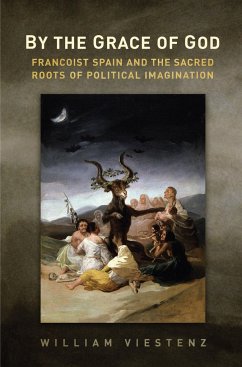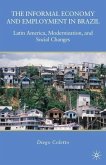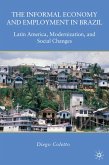- Gebundenes Buch
- Merkliste
- Auf die Merkliste
- Bewerten Bewerten
- Teilen
- Produkt teilen
- Produkterinnerung
- Produkterinnerung
Using Franco’s Spain and la España sagrada as a counterpoint to European secularity’s own development, By the Grace of God is the first sustained analysis within Spanish cultural studies of the sacred as a political category and a tool for political organization.
Andere Kunden interessierten sich auch für
![Control and Resistance Control and Resistance]() Lara AndersonControl and Resistance72,99 €
Lara AndersonControl and Resistance72,99 €![States and Nations, Power and Civility States and Nations, Power and Civility]() States and Nations, Power and Civility106,99 €
States and Nations, Power and Civility106,99 €![Uncomfortable Conversations with a Black Man Uncomfortable Conversations with a Black Man]() Emmanuel AchoUncomfortable Conversations with a Black Man9,99 €
Emmanuel AchoUncomfortable Conversations with a Black Man9,99 €![Rethinking the Chicano Movement Rethinking the Chicano Movement]() Marc Simon RodriguezRethinking the Chicano Movement202,99 €
Marc Simon RodriguezRethinking the Chicano Movement202,99 €![The Informal Economy and Employment in Brazil The Informal Economy and Employment in Brazil]() Diego ColettoThe Informal Economy and Employment in Brazil37,99 €
Diego ColettoThe Informal Economy and Employment in Brazil37,99 €![The Informal Economy and Employment in Brazil The Informal Economy and Employment in Brazil]() Diego ColettoThe Informal Economy and Employment in Brazil37,99 €
Diego ColettoThe Informal Economy and Employment in Brazil37,99 €![The Myth of Indigenous Caribbean Extinction The Myth of Indigenous Caribbean Extinction]() Tony CastanhaThe Myth of Indigenous Caribbean Extinction64,99 €
Tony CastanhaThe Myth of Indigenous Caribbean Extinction64,99 €-
-
-
Using Franco’s Spain and la España sagrada as a counterpoint to European secularity’s own development, By the Grace of God is the first sustained analysis within Spanish cultural studies of the sacred as a political category and a tool for political organization.
Hinweis: Dieser Artikel kann nur an eine deutsche Lieferadresse ausgeliefert werden.
Hinweis: Dieser Artikel kann nur an eine deutsche Lieferadresse ausgeliefert werden.
Produktdetails
- Produktdetails
- Verlag: University of Toronto Press
- Seitenzahl: 240
- Erscheinungstermin: 8. September 2014
- Englisch
- Abmessung: 237mm x 158mm x 20mm
- Gewicht: 477g
- ISBN-13: 9781442647572
- ISBN-10: 1442647574
- Artikelnr.: 40109190
- Herstellerkennzeichnung
- Libri GmbH
- Europaallee 1
- 36244 Bad Hersfeld
- 06621 890
- Verlag: University of Toronto Press
- Seitenzahl: 240
- Erscheinungstermin: 8. September 2014
- Englisch
- Abmessung: 237mm x 158mm x 20mm
- Gewicht: 477g
- ISBN-13: 9781442647572
- ISBN-10: 1442647574
- Artikelnr.: 40109190
- Herstellerkennzeichnung
- Libri GmbH
- Europaallee 1
- 36244 Bad Hersfeld
- 06621 890
William Viestenz is an assistant professor of Spanish and Global Studies at the University of Minnesota.
Acknowledegments
1. Introduction: La España Sagrada as a Political Category
Francoist Spain, Post-Secularism, and a Sacred Politics
The Sacred’s Slippage into the Profane
The Sacred and Metaphysics
Spain’s ‘Time of the Sacred’: Literature as a Political Matter
Iberian Studies: A Parallax View
2. ‘He aquí una plenitud española’: Catholicism, Cultural Regeneration, and
Spanish Essentialism
Por Dios hacia el imperio: Spanish First Causes
Nineteenth-Century Spain: Cuando la legalidad no basta
Spanish Regenerationism: Displacing the Sacred onto the Secular
Catholicism as a Social Force: 1936
3. Politics by Other Means: The Sacred Core of Collective Imagining
Post-War Stimmung
The Scapegoat Mechanism and the Mimetic Reduction of Difference
Beyond the Victimary Principle
4. Intimate Strife: Inside Juan Goytisolo’s Sovereign Exception
Against Sacred Forms
Conde Julián’s Inclusive Exclusion
Human, All Too Human
A New Nomos of the Earth?
5. The Eternal Present of Sacred Time
‘In illo tempore’
Numa’s Sacred Wood
Killing Time: Ritual Death and the Origins of the Sacred
6. ‘Desacralization’ and ‘Sacrogenesis’, or How to Step Outside of Sacred
Time
Sacred Dialectics
Le regard d’autrui: The State’s Loving Embrace
Rerouting Sacred Time: Tiempo de destrucción
7. Espriu’s Sepharad and the Equitable Restoration of Sacred Sovereignty
Sacrifice and the Poetic Expulsion of Self
The Sacred Bonds of Kinship
Death by Way of the Pen: Les hores
Espriu’s kehre: El caminant i el mur&
Final del laberint: Redeeming a Lost Religiousness
Rethinking Iberia: A New Temple of Sacred Communion
8. Conclusion: The Aesthetic Disruption of Political Truth
Works Cited
Index
1. Introduction: La España Sagrada as a Political Category
Francoist Spain, Post-Secularism, and a Sacred Politics
The Sacred’s Slippage into the Profane
The Sacred and Metaphysics
Spain’s ‘Time of the Sacred’: Literature as a Political Matter
Iberian Studies: A Parallax View
2. ‘He aquí una plenitud española’: Catholicism, Cultural Regeneration, and
Spanish Essentialism
Por Dios hacia el imperio: Spanish First Causes
Nineteenth-Century Spain: Cuando la legalidad no basta
Spanish Regenerationism: Displacing the Sacred onto the Secular
Catholicism as a Social Force: 1936
3. Politics by Other Means: The Sacred Core of Collective Imagining
Post-War Stimmung
The Scapegoat Mechanism and the Mimetic Reduction of Difference
Beyond the Victimary Principle
4. Intimate Strife: Inside Juan Goytisolo’s Sovereign Exception
Against Sacred Forms
Conde Julián’s Inclusive Exclusion
Human, All Too Human
A New Nomos of the Earth?
5. The Eternal Present of Sacred Time
‘In illo tempore’
Numa’s Sacred Wood
Killing Time: Ritual Death and the Origins of the Sacred
6. ‘Desacralization’ and ‘Sacrogenesis’, or How to Step Outside of Sacred
Time
Sacred Dialectics
Le regard d’autrui: The State’s Loving Embrace
Rerouting Sacred Time: Tiempo de destrucción
7. Espriu’s Sepharad and the Equitable Restoration of Sacred Sovereignty
Sacrifice and the Poetic Expulsion of Self
The Sacred Bonds of Kinship
Death by Way of the Pen: Les hores
Espriu’s kehre: El caminant i el mur&
Final del laberint: Redeeming a Lost Religiousness
Rethinking Iberia: A New Temple of Sacred Communion
8. Conclusion: The Aesthetic Disruption of Political Truth
Works Cited
Index
Acknowledegments
1. Introduction: La España Sagrada as a Political Category
Francoist Spain, Post-Secularism, and a Sacred Politics
The Sacred’s Slippage into the Profane
The Sacred and Metaphysics
Spain’s ‘Time of the Sacred’: Literature as a Political Matter
Iberian Studies: A Parallax View
2. ‘He aquí una plenitud española’: Catholicism, Cultural Regeneration, and
Spanish Essentialism
Por Dios hacia el imperio: Spanish First Causes
Nineteenth-Century Spain: Cuando la legalidad no basta
Spanish Regenerationism: Displacing the Sacred onto the Secular
Catholicism as a Social Force: 1936
3. Politics by Other Means: The Sacred Core of Collective Imagining
Post-War Stimmung
The Scapegoat Mechanism and the Mimetic Reduction of Difference
Beyond the Victimary Principle
4. Intimate Strife: Inside Juan Goytisolo’s Sovereign Exception
Against Sacred Forms
Conde Julián’s Inclusive Exclusion
Human, All Too Human
A New Nomos of the Earth?
5. The Eternal Present of Sacred Time
‘In illo tempore’
Numa’s Sacred Wood
Killing Time: Ritual Death and the Origins of the Sacred
6. ‘Desacralization’ and ‘Sacrogenesis’, or How to Step Outside of Sacred
Time
Sacred Dialectics
Le regard d’autrui: The State’s Loving Embrace
Rerouting Sacred Time: Tiempo de destrucción
7. Espriu’s Sepharad and the Equitable Restoration of Sacred Sovereignty
Sacrifice and the Poetic Expulsion of Self
The Sacred Bonds of Kinship
Death by Way of the Pen: Les hores
Espriu’s kehre: El caminant i el mur&
Final del laberint: Redeeming a Lost Religiousness
Rethinking Iberia: A New Temple of Sacred Communion
8. Conclusion: The Aesthetic Disruption of Political Truth
Works Cited
Index
1. Introduction: La España Sagrada as a Political Category
Francoist Spain, Post-Secularism, and a Sacred Politics
The Sacred’s Slippage into the Profane
The Sacred and Metaphysics
Spain’s ‘Time of the Sacred’: Literature as a Political Matter
Iberian Studies: A Parallax View
2. ‘He aquí una plenitud española’: Catholicism, Cultural Regeneration, and
Spanish Essentialism
Por Dios hacia el imperio: Spanish First Causes
Nineteenth-Century Spain: Cuando la legalidad no basta
Spanish Regenerationism: Displacing the Sacred onto the Secular
Catholicism as a Social Force: 1936
3. Politics by Other Means: The Sacred Core of Collective Imagining
Post-War Stimmung
The Scapegoat Mechanism and the Mimetic Reduction of Difference
Beyond the Victimary Principle
4. Intimate Strife: Inside Juan Goytisolo’s Sovereign Exception
Against Sacred Forms
Conde Julián’s Inclusive Exclusion
Human, All Too Human
A New Nomos of the Earth?
5. The Eternal Present of Sacred Time
‘In illo tempore’
Numa’s Sacred Wood
Killing Time: Ritual Death and the Origins of the Sacred
6. ‘Desacralization’ and ‘Sacrogenesis’, or How to Step Outside of Sacred
Time
Sacred Dialectics
Le regard d’autrui: The State’s Loving Embrace
Rerouting Sacred Time: Tiempo de destrucción
7. Espriu’s Sepharad and the Equitable Restoration of Sacred Sovereignty
Sacrifice and the Poetic Expulsion of Self
The Sacred Bonds of Kinship
Death by Way of the Pen: Les hores
Espriu’s kehre: El caminant i el mur&
Final del laberint: Redeeming a Lost Religiousness
Rethinking Iberia: A New Temple of Sacred Communion
8. Conclusion: The Aesthetic Disruption of Political Truth
Works Cited
Index








